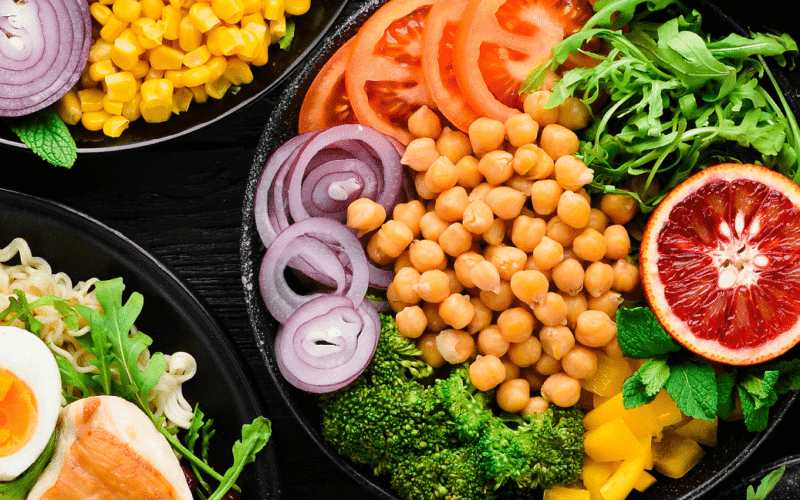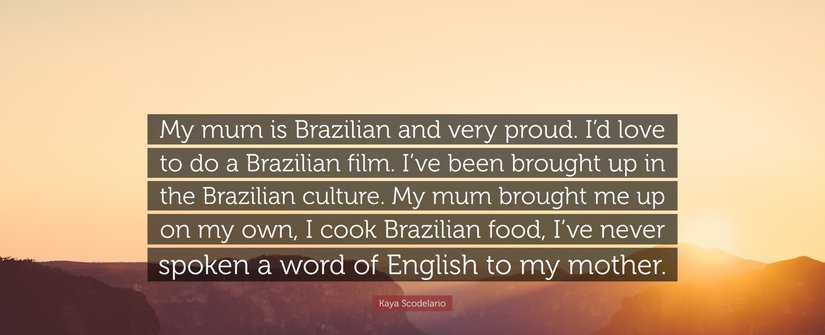Brazilian Diet – Lose 12 Kg In 1 Month!!

The Brazilian diet is a traditional meal consuming style that is characterized by a variety of foods, including fresh fruits and vegetables, lean meats, and whole grains. It also emphasizes the consumption of healthy fats, such as those found in nuts, seeds, and avocados.
Additionally, the Brazilian diet is known for its use of traditional ingredients and seasonings, such as chili peppers, cilantro, and lime. It also includes a moderate amount of red meat, fish and seafood, and a moderate to high consumption of legumes, such as black beans and lentils. The Brazilian diet includes a moderate consumption of dairy products, such as cheese and yogurt, and a moderate consumption of wine.
Brazilian diet is considered the newest trend nowadays. The result it gives is what makes it really popular. There are two versions of this diet – fast and normal.
You should not try the fast version because it can negatively affect your overall health. Try the normal version of the Brazilian diet, which you will read about in this article.
It includes mainly fruits and vegetables, which is pretty good for your health. You will need to consume 4-5 meals every day and if you stick to this plan you will get the desired results.
DIET PLAN FOR 1 WEEK
Monday:
- Breakfast: Oatmeal with fresh berries and a scoop of protein powder
- Snack: Greek yogurt with almond butter and honey
- Lunch: Grilled chicken breast with a side of quinoa and steamed vegetables
- Snack: Carrots and hummus
- Dinner: Baked salmon with a side of roasted sweet potatoes and asparagus
Tuesday:
- Breakfast: Scrambled eggs with spinach and tomatoes, served with whole wheat toast
- Snack: Apple slices with natural peanut butter
- Lunch: Turkey and avocado wrap with a side of mixed greens salad
- Snack: Cucumber and feta cheese slices
- Dinner: Chicken stir-fry with brown rice, broccoli, and bell peppers
Wednesday:
- Breakfast: Smoothie bowl made with Greek yogurt, frozen berries, and chia seeds
- Snack: Handful of almonds
- Lunch: Grilled chicken Caesar salad
- Snack: Cottage cheese with fresh berries
- Dinner: Baked cod with a side of roasted cauliflower and green beans
Thursday:
- Breakfast: Whole wheat pancakes with turkey bacon and fresh berries
- Snack: Hard-boiled egg
- Lunch: Turkey and cheese sandwich on whole wheat bread with a side of baby carrots
- Snack: Rice cakes with almond butter and honey
- Dinner: Spaghetti with turkey meatballs and a side of mixed greens salad
Friday:
- Breakfast: Avocado toast with a fried egg and turkey bacon
- Snack: Fresh fruit
- Lunch: Grilled chicken breast with a side of sweet potato fries
- Snack: Greek yogurt with granola and honey
- Dinner: Baked chicken with a side of roasted Brussels sprouts and yellow squash
Saturday:
- Breakfast: Scrambled eggs with turkey sausage and a side of whole wheat toast
- Snack: Carrots and hummus
- Lunch: Tuna salad sandwich on whole wheat bread with a side of mixed greens salad
- Snack: Fresh fruit
- Dinner: Grilled shrimp with a side of brown rice and steamed vegetables
Sunday:
- Breakfast: Whole wheat waffles with turkey bacon and fresh berries
- Snack: Greek yogurt with honey
- Lunch: Turkey chili with a side of mixed greens salad
- Snack: Handful of almonds
- Dinner: Baked pork chops with a side of roasted sweet potatoes and asparagus
Note: Drink at least 8 cups of water per day and avoid processed foods, sugary drinks, and excess sodium. Consult a doctor or a dietitian before starting any new diet plan.
Benefits of Brazilian diet
One of the key benefits of the Brazilian diet is that it is high in fiber which helps in maintaining a healthy weight by keeping you full for longer periods. This can help to reduce the risk of obesity, diabetes and other chronic diseases.
Another benefit is that this diet is rich in antioxidants, which can help to reduce the risk of chronic diseases, such as cancer and heart disease. It also includes a moderate amount of healthy fats, such as olive oil and avocado, which can help to lower cholesterol and reduce the risk of heart disease.
The Brazilians diet also promotes an active lifestyle and encourages physical activity. This can help to increase cardiovascular fitness and overall health.
Contraindications for Brazilian diet
There are no specific contraindications for the Brazilian diet as it is based on the principle of consuming natural or minimally processed foods. However, it’s important to note that if you have any food allergies or dietary restrictions, such as gluten-free or vegan diets, you should consult a healthcare professional before making any dietary changes. Additionally, people with certain medical conditions such as diabetes or heart disease should also consult a doctor before making any major dietary changes.
FAQ
Q: What are some of the key components of the Brazilian diet?
A: Some key components of the Brazilian diet include a focus on fruits and vegetables, whole grains, lean proteins such as fish and poultry, and healthy fats like olive oil and avocado. It also includes traditional staples like beans, rice, and corn.
Q: What are the benefits of following the Brazilian diet?
A: The Brazilian diet is rich in nutrients and may help reduce the risk of chronic diseases such as heart disease, diabetes, and obesity. It may also help improve overall health and well-being, boost energy levels, and promote weight loss.
Q: What are some examples of foods that are typically included in the Brazilian diet?
A: Some examples of foods that are typically included in the Brazilian diet include fruits such as acai and guava, vegetables such as kale and collard greens, whole grains like quinoa and brown rice, lean proteins like chicken and fish, and healthy fats like avocado and coconut oil.
Q: Are there any contraindications to following the Brazilian diet?
A: It is always important to consult with a healthcare professional before making any significant changes to your diet, especially if you have any health conditions or dietary restrictions. The Brazilian diet may be high in carbohydrates, so it is not recommended for individuals with diabetes or other conditions that require a low-carb diet.

What is special about Brazilian Food
While the Brazilian diet, which emphasizes natural and minimally processed foods, is generally considered healthy, there are certain contraindications to consider. For individuals with certain dietary restrictions, such as gluten or lactose intolerance, certain traditional Brazilian dishes may not be suitable. Additionally, the diet’s emphasis on fresh fruits, vegetables, and lean proteins may not be appropriate for individuals who require a higher calorie or carbohydrate intake, such as those with certain medical conditions or who engage in heavy physical activity.
It is important to consult with a healthcare professional or registered dietitian before making any drastic changes to your diet, particularly if you have any pre-existing health conditions or are taking any medications. They can help you to create a personalized diet plan that suits your individual needs and goals.
Doctors about diet
Brazil’s food guide, created by leading health experts, aims to steer citizens away from highly processed foods and towards natural and minimally processed options. Professor Jean-Claude Moubarac of the University of Montreal, who helped devise the guidelines, argues that these ultra-processed foods are not real foods but rather “formulations of industrial substances and additives, carefully selected to make a product that is durable, highly appealing and prone to overconsumption.”
The guide also emphasizes the importance of simple and straightforward food rules, rather than confusing distinctions between different types of fats. Carlos Monteiro, a public health expert from the University of Sao Paulo and one of the guide’s key creators, states “People don’t need to understand the difference between saturated fats and unsaturated fats.” The guide’s golden rule is simple: always opt for natural or minimally processed foods and freshly made meals over ultra-processed options.
Furthermore, the guide cautions consumers to be wary of the food industry’s marketing tactics, as manufacturers have convinced many that “what goes on in the kitchen and what goes on in the factory are the same,” says Moubarac. The guide reminds us that the two are vastly different, and encourages consumers to make informed choices about the food they eat.
Key Takeaways
- The Brazilian diet emphasizes natural, minimally processed foods and freshly made meals over ultra-processed foods.
- The Brazilian diet is rich in fruits, vegetables, whole grains, lean proteins, and healthy fats.
- Brazilians have a tradition of consuming a variety of foods, including traditional dishes such as feijão (black beans), rice, and meat, as well as seafood and fruits.
- The Brazilian diet is influenced by Portuguese and African cuisines, and is known for its Bahian cuisine which is a combination of Portuguese and African flavors.
- The Brazilian diet is associated with lower rates of obesity and chronic diseases such as diabetes and heart disease.
- The Brazilian government has also developed a healthy eating guide that encourages the consumption of natural, minimally processed foods.
- The Brazilian diet is also relatively low in added sugars, saturated fats, and processed foods, which are all associated with increased risk of chronic diseases.
- It is always recommended to consult with a healthcare professional or a nutritionist to ensure that the diet is appropriate for individual health needs and conditions.









